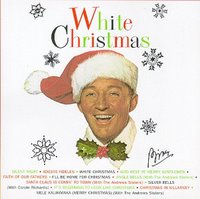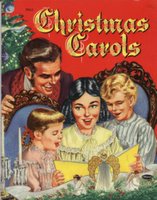Where Did All the Carols Go: Christmastime Nostalgia for World War II
 Two weeks ago, I happened to catch one of those inane human-interest stories they run at the end of the evening world news to distract you from how terrible everything is. New Orleans is crumbling, soldiers are dying in Iraq, and this reporter wants to know why it's been so long since anyone has written a classic holiday song! "White Christmas," "Have Yourself a Merry Little Christmas," "The Christmas Song (Chestnuts Roasting on an Open Fire)," "Rudolph the Red Nose Reindeer." All the real classics seem to have been written in the 1940s and '50s. By way of explanation, the reporter offered a brief, three-minute profile of one of the men who co-wrote "Silver Bells," chronicling his heartwarming quest to write one more hit carol before he dies. The profile's only attempt to address why so many Yuletide hits were written during a ten- to fifteen-year period that began halfway through World War II was in its conclusion: times have changed, music now is sold by the album, not the song.
Two weeks ago, I happened to catch one of those inane human-interest stories they run at the end of the evening world news to distract you from how terrible everything is. New Orleans is crumbling, soldiers are dying in Iraq, and this reporter wants to know why it's been so long since anyone has written a classic holiday song! "White Christmas," "Have Yourself a Merry Little Christmas," "The Christmas Song (Chestnuts Roasting on an Open Fire)," "Rudolph the Red Nose Reindeer." All the real classics seem to have been written in the 1940s and '50s. By way of explanation, the reporter offered a brief, three-minute profile of one of the men who co-wrote "Silver Bells," chronicling his heartwarming quest to write one more hit carol before he dies. The profile's only attempt to address why so many Yuletide hits were written during a ten- to fifteen-year period that began halfway through World War II was in its conclusion: times have changed, music now is sold by the album, not the song.How insightful! I should clarify that many of the most enduring Christmas songs -- "Jingle Bells," "Silent Night," "Away in a Manger" -- were written in the 19th century. I should also point out that the success of the American popular song hasn't exactly been replaced by the triumph of the long-playing pop album. The ascendance of the LP format in the 1960s and '70s may well have had something to do with the lack of hit Christmas songs written during this period. More likely, it was the fact that Americans were no longer interested in buying the image these songs were selling. The post-War industrial boom had long since busted and people seemed to have less money and opportunities to make their spirits bright. By the time I was growing up in the '80s and '90s, for instance, more Americans seemed to connect with the sentiment of a song like "Grandma Got Run Over by a Reindeer" than "Have Yourself a Merry Little Christmas."
That said, there is something truly persistent about those WWII and post-War carols. Not only are they still played on the radio, performed by contemporary musicians, and regularly featured on televised holiday specials, echoes of them can be heard in holiday advertising jingles, which are often written in a vaguely swing-music style to evoke the spirit of the WWII era. This is the same reason why people like Harry Connick, Jr. and Brian Setzer, whose performance styles are rooted in big band swing, make such a killing with Christmas-themed albums.
 In any case, the point is that a lot of people still feel really tender for a time when it seemed like Christmas was more ideal and perfect. Yet this ideal may prove elusive. When it became a hit in 1942, "White Christmas" was already rife with nostalgic longing for a Christmas "just like the ones we used to know." It was the perfect piece of wartime propaganda, an emotional locus that would satisfy the need for Americans both home and abroad to believe in what they were fighting for. Nine years later, when "Silver Bells" became a hit in 1951, citizens were reminded that the fight was not over; that the post-War era would demand a new imperative: "city sidewalks, busy sidewalks, dressed in holiday style." Thus "Silver Bells" is a celebration of red and green lights, Christmas time in the city, and most of all -- shopping.
In any case, the point is that a lot of people still feel really tender for a time when it seemed like Christmas was more ideal and perfect. Yet this ideal may prove elusive. When it became a hit in 1942, "White Christmas" was already rife with nostalgic longing for a Christmas "just like the ones we used to know." It was the perfect piece of wartime propaganda, an emotional locus that would satisfy the need for Americans both home and abroad to believe in what they were fighting for. Nine years later, when "Silver Bells" became a hit in 1951, citizens were reminded that the fight was not over; that the post-War era would demand a new imperative: "city sidewalks, busy sidewalks, dressed in holiday style." Thus "Silver Bells" is a celebration of red and green lights, Christmas time in the city, and most of all -- shopping.Over the years, a lot of people have really believed in Christmas as a season of unambiguous joy, forgiveness, and generosity. I guess plenty of them still do. But the lack of a recent carol to articulate the terms of a new Christmas utopia suggests that -- for the foreseeable future, at least -- Christmas will remain the imperfect, corporate-funded adoration of commerce and American-Christianity that it is now. A shaky house of cards built on the crumbling foundation of an ailing ideal.
Check it out: NPR takes on this same story, with all the pointlessness of the evening news.


0 Comments:
Post a Comment
<< Home